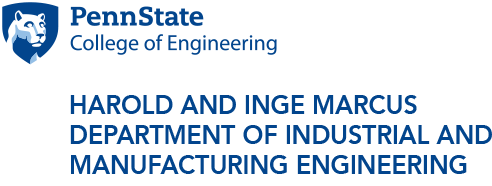
Joseph Sinclair at Imperial Machine & Tool Co. with a SLM 280HL Metal 3D-Printer. IMAGE: JOSEPH SINCLAIR
First World Campus degree in additive manufacturing and design awarded
12/19/2018
UNIVERSITY PARK, Pa. — Joseph Sinclair always knew he wanted to set the trends, not follow them. As the first graduate of the master of engineering in additive manufacturing and design master’s (AMD) program through Penn State World Campus, he’s staying true to that mission.
A native of Reading, Pennsylvania, Sinclair graduated with degrees in mechanical and nuclear engineering from Penn State in 2015. While pursuing those degrees, he founded his own 3D printing startup, Solid Dynamics, LLC. “I realized additive manufacturing (AM) was something I was passionate about, so I basically got my hands on every 3D printer they had on campus!” he said.
After his graduation, he continued growing his startup, eventually joining Imperial Machine & Tool Co., an advanced manufacturing company, as director of their metal additive manufacturing division.
When he learned of the new program at Penn State, the first institution to offer an AMD degree online, he knew he couldn’t pass up the opportunity to gain a competitive advantage.
“From my standpoint, you always have to keep learning and stay up to speed with the latest innovations the technology has to offer,” Sinclair said. “The flexibility of World Campus was the only way I’d be able to work my day jobs and complete my degree.”
Penn State’s World Campus experience was a perfect fit, where he could continue directing Imperial’s facility and educate himself on the latest industry developments in his free time.
“Better yet, I immediately found my classes applicable to my job,” he explained. “An issue with working in industry is you often get caught up in how things are currently done and don’t necessarily stop to look toward the future or discern how to approach problems in a new way.”
He continued, “But by completing this degree while working, I was able to live in both worlds – understanding the day-to-day problems we face in industry and expand my knowledge on the theoretical side of the technology in order to see where improvements could be made.”
As part of the AMD master’s program, students attend a week-long, hands-on lab offered at the University Park campus. With access to highly trained personnel and state-of-the art additive manufacturing equipment, the students have a unique opportunity.
“To Penn State’s credit, enabling online students to come to campus and experience using AM machines and equipment is invaluable,” he said. With several facilities dedicated to additive manufacturing, including the Center for Innovative Materials Processing through Direct Digital Deposition (CIMP-3D) and the Factory for Advanced Manufacturing Education (FAME), Penn State offers the competitive edge needed to become a leader in the field.
“It was great having Joe in the program and seeing how he took his classroom knowledge and immediately applied it to his day job,” said Timothy W. Simpson, Paul Morrow Professor of Engineering Design and Manufacturing and director of the AMD program. “In turn, Joe also shared his industry experiences and day-to-day challenges with AM with us to make sure that what we were teaching in the hands-on lab and AMD courses was reflective of the real-world. It was a truly win-win situation!”
During his time at Penn State, Sinclair also witnessed the explosive growth of the additive manufacturing field. When his employer, Imperial Machine & Tool Co., was acquired by Kaiser Aluminum in 2018 for their additive capabilities, he knew he made the right choice to pursue a master’s degree in AMD.
“Kaiser looks at what we are doing with metal additive manufacturing and knows it’s going to be important for the future,” he said. “And Penn State knows as these companies grow, they will need more people educated on AMD to run these machines effectively.”
He explained, “I am proud to have the opportunity to grow with the industry and help shape its impact on traditional manufacturing.”
With his professional experience, Sinclair wanted to use his master’s project to help pinpoint and solve the problems that emerge as the technology is adopted and refined. “When a company buys a 3D printing machine, they want to just fire it up and start working,” he said. “But I know that’s easier said than done and it’s not as simple as just pressing print.”
Companies often struggle to prepare engineers to operate and troubleshoot the machines and software. Additionally, companies are often unaware of how to incorporate part traceability, a practice common in “traditional” manufacturing. Historically, each part is tracked through the manufacturing process to ensure high quality and craftmanship. However, this practice is difficult to incorporate into the 3D printing process.
“To address these issues, my project focused on explaining the state of additive technology and breaking down the problems that exist while also discerning ways for industry to address them,” he said.
Sinclair added, “It basically became a guide for how to take this additive technology from a research and development state and make it into a turnkey manufacturing operation for businesses to leverage in today’s competitive climate. Simply put, I detailed how to make additive manufacturing scalable and useful to the masses.”
Once again, Sinclair infused his real-world experience into his academic career. By completing the program, he not only became more technically proficient in the field, but also enabled himself to become a thought leader on the future of the industry.
He said, “I have a long-term vision for additive manufacturing and being the first person with this degree [from Penn State World Campus] allows me to set the tone for the future of AMD. That’s my mentality.”
Visit the Penn State World Campus website for more information about the master’s degree in additive manufacturing and design.



